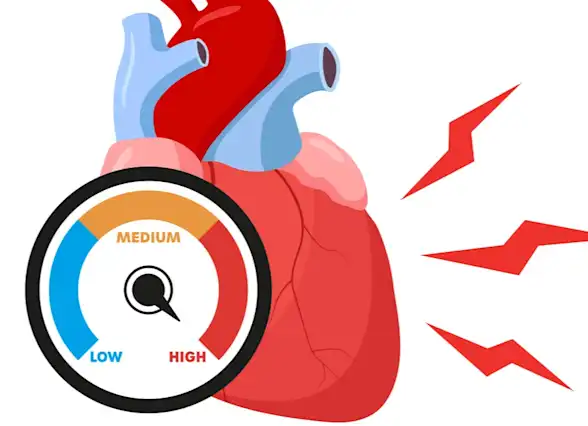Hypertension is the Leading Cause of Heart Disease
Hypertension (chronic high blood pressure) is the leading cause of heart disease, and heart disease is the leading cause of heart attack.
Get insurance benefits, legal documents, and medical records in one place

Helpful Highlights
There are often no symptoms of hypertension for years and damage to the heart has already occurred. This is why it's called "the silent killer."
Hypertensive heart disease is the leading cause of illness and death from chronic high blood pressure (hypertension).
Hypertension, combined with fat and cholesterol deposits in the blood vessels, significantly increases the risk of heart attack (and stroke).
Hypertension is the most common modifiable (controllable) risk factor for cardiovascular disease.
Hypertension can cause many heart problems and is the leading cause of heart disease, also called coronary artery disease (CAD), where the arteries that supply blood to the heart muscle itself are narrowed and damaged. Too little blood flow to the heart can lead to chest pain (angina), irregular heart rhythms (arrhythmias), or a heart attack.
Other heart problems include an enlarged or thickened left heart (the heart's main pumping chamber that delivers blood to the rest of the body), which is the leading cause of heart failure and contributes to the risk of heart attack and sudden cardiac death, and heart failure due to the strain on the heart that weakens it over time.
So, what can your loved one do to prevent or control hypertension?
Hypertension prevention or control without medication
STOP SMOKING
Reduce sodium (salt) intake
Eat a heart-healthy diet (fresh fruits and veggies, lean meats, whole grains, home-cooked, limit processed and fast foods)
Lose extra pounds and watch the waistline
Carrying too much weight around the waist - called central obesity - can increase the risk of high blood pressure (and diabetes)
Stay active, exercise regularly
Get adequate sleep
Limit alcohol intake
Reduce stress
Monitor blood pressure (once daily at different times of the day)
Get regular check-ups
Gather support to accomplish these (friends, family, community)
Medications used to control high blood pressure
Diuretics
Beta-blockers
Angiotensin-converting enzyme (ACE) inhibitors
Angiotensin II receptor blockers (ARB)
Calcium channel blockers (CCB)
Alpha-blockers
Alpha-2 receptor agonists
Combined alpha and beta-blockers
Vasodilators
How hypertension leads to heart attack
The strain and damage from prolonged high blood pressure cause the coronary arteries to become narrowed and hardened from plaque — a buildup of fat, cholesterol, and other substances — and increases the risk of blood clots forming.
When an artery becomes blocked due to plaque buildup or a blood clot, the flow of blood through the heart muscle is reduced or stopped, starving the muscle of oxygen and nutrients. The resulting damage or death of part of the heart muscle is a heart attack.
Hypertension causes more than heart disease
It can cause many complications throughout the body, especially in places where there are very tiny arteries present.
Aneurysms
Stroke (TIA or CVA)
Thinking and memory problems
Kidney disease and failure
Vision loss
Sexual dysfunction
Peripheral artery disease (PAD)
Other hypertensive crises
Talk with your loved one's provider about ideal blood pressure, weight, and diet, as well as the support available for achieving it. Many health plans have screening benefits, as well as benefits for exercise, nutrition, and monitoring devices (such as a blood pressure cuff).
RESOURCES
American College of Cardiology (ACC)
American Heart Association (AHA)
National Institutes of Health Heart Lung & Blood Institute - The Heart Truth
No content in this app, regardless of date, should ever be used as a substitute for direct medical advice from your doctor or other qualified clinician.
Get more support and guidance on insurance benefits, medical records and legal forms.
Helpful brings together your insurance benefits, legal documents, and medical records in one personalized place — so you always know what you have, and never have to search again.

Technology for Health Tasks. Mental Health for the Tough Stuff.
Helpful connects your medical records, insurance, and caregiving tasks automatically. And when you need more than logistics, a therapist is here to guide you.
In-Network and Covered
For Individuals, Couples and Families
HIPAA Compliant, Data Stays Private


Healthcare Tasks Simplified

From syncing records to spotting drug interactions, Helpful does the heavy lifting, turning complex health info into clear tasks and showing you benefits you can actually use, giving you clarity and control over your care.

In-Network Mental Health

Our licensed therapists are here to support you and your loved ones through stress, burnout, and life’s hardest moments, with an inclusive, compassionate approach that works with most insurance plans.

Create Legal Documents

Plan ahead by creating will, trusts, advance directives and more, that ensure your wishes are honored in the event you can’t speak for yourself -with Helpful guiding you every step of the way.